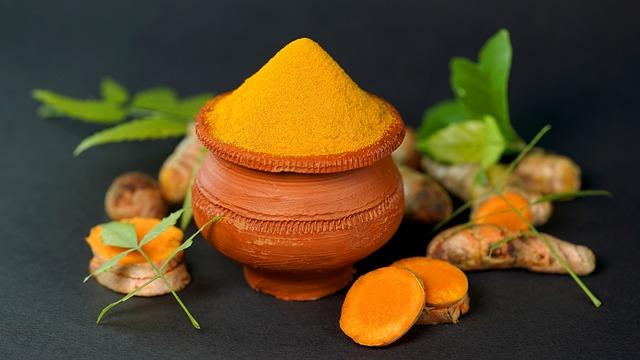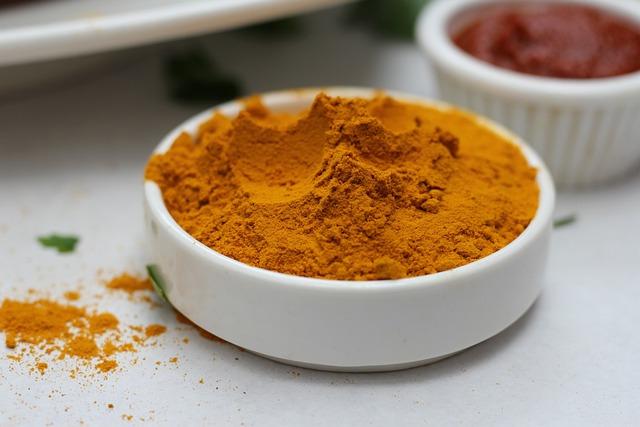No products in the cart.
Turmeric-7 Little-known health benefits of this wonder herb
Introduction
Turmeric is a spice commonly used in Indian cuisine and is known for its distinctive yellow color and unique flavor. However, turmeric is more than just a spice. It has been used in traditional medicine for thousands of years due to its many health benefits. Recently, turmeric has gained popularity in modern medicine for its natural anti-inflammatory and antioxidant properties. In this blog post, we will explore seven little-known health benefits of turmeric. We will discuss how turmeric can benefit various aspects of our health, from reducing inflammation and promoting digestion to supporting brain and cardiovascular health. With this knowledge, readers can incorporate turmeric into their daily routine to improve their overall health and well-being. So let’s dive into the wonders of turmeric and discover the many benefits it has to offer.

Anti-inflammatory properties
One of the most well-known properties of turmeric is its anti-inflammatory effect, which is attributed to its active compound, curcumin. Curcumin is a natural polyphenol that has been extensively studied for its therapeutic potential. It is a powerful antioxidant that can scavenge free radicals and prevent oxidative damage. Curcumin also has potent anti-inflammatory properties that make it an effective natural remedy for a range of inflammatory diseases, including arthritis, ulcerative colitis, and skin disorders.
The anti-inflammatory properties of curcumin are attributed to its ability to inhibit the activity of several pro-inflammatory enzymes and cytokines, including COX-2, TNF-alpha, and IL-6. These enzymes and cytokines are responsible for initiating and maintaining the inflammatory response in the body. By inhibiting their activity, curcumin can reduce the severity of inflammation and alleviate associated symptoms. Additionally, curcumin can modulate the expression of genes involved in inflammation, further reducing the inflammatory response. These effects make curcumin a promising therapeutic agent for the prevention and treatment of chronic inflammatory diseases.
Antioxidant properties
Antioxidants are compounds that can prevent or slow down damage to cells caused by free radicals, which are unstable molecules that can harm cells and contribute to the development of chronic diseases. Curcumin, the active compound in turmeric, is a powerful antioxidant that can scavenge free radicals and prevent oxidative damage. This makes turmeric a promising natural remedy for a range of health problems associated with oxidative stress, including cardiovascular disease, diabetes, and cancer.
In addition to preventing oxidative damage, the antioxidant properties of turmeric can also support overall health and well-being. Studies have shown that curcumin can improve brain function and lower the risk of age-related cognitive decline. It may also have anti-aging effects on the skin, reducing the appearance of fine lines and wrinkles. Curcumin may also support immune function by increasing the activity of immune cells and reducing inflammation. Overall, the antioxidant properties of turmeric make it a valuable addition to a healthy diet and lifestyle, and it may offer numerous health benefits for individuals looking to improve their overall well-being.

Digestive health benefits
One of the most well-known digestive health benefits of turmeric is its ability to alleviate symptoms of irritable bowel syndrome (IBS). IBS is a common digestive disorder that can cause abdominal pain, bloating, and changes in bowel habits. Studies have shown that curcumin can help reduce inflammation in the gut and improve digestive function, resulting in a reduction in IBS symptoms.
Turmeric may also be effective in treating other digestive disorders, such as ulcerative colitis and Crohn’s disease. These conditions are characterized by chronic inflammation in the gut, which can cause abdominal pain, diarrhea, and other symptoms. Curcumin has been shown to reduce inflammation in the gut, potentially providing relief from these symptoms.
Turmeric may also support the production of digestive enzymes, which are necessary for the breakdown of food and the absorption of nutrients. This can improve overall digestive function and may help alleviate symptoms of indigestion and other digestive problems.
Brain health benefits
Turmeric has been shown to have numerous benefits for brain health, thanks to its active compound, curcumin. Curcumin has been shown to have powerful antioxidant and anti-inflammatory effects, which can protect the brain from damage and promote healthy brain function. Studies have shown that curcumin can improve memory and cognitive function in older adults, potentially reducing the risk of age-related cognitive decline and neurodegenerative diseases such as Alzheimer’s and Parkinson’s.
In addition to its cognitive benefits, turmeric may also have mood-enhancing effects. Some studies have suggested that curcumin can improve symptoms of depression and anxiety, possibly by increasing levels of serotonin and dopamine, which are neurotransmitters that regulate mood. Curcumin may also reduce inflammation in the brain, which has been linked to the development of depression and other mood disorders.
Cardiovascular health benefits
Turmeric has been shown to have numerous cardiovascular health benefits, thanks to its anti-inflammatory and antioxidant properties. Inflammation is a major contributor to cardiovascular disease, which is the leading cause of death worldwide. Curcumin, the active compound in turmeric, has been shown to reduce inflammation and oxidative stress, which can help prevent the development of heart disease.
Studies have also suggested that turmeric may have cholesterol-lowering effects. High levels of LDL cholesterol, also known as “bad” cholesterol, can contribute to the development of heart disease. Some research has shown that curcumin can lower LDL cholesterol levels and improve overall cholesterol profile, potentially reducing the risk of heart disease.
Pain Relief Benefits
Research has also suggested that curcumin may have a direct effect on pain perception in the body. One study found that curcumin can reduce pain sensitivity by blocking the production of certain pain-inducing molecules in the body. Another study found that curcumin can increase levels of natural pain-relieving chemicals in the body, such as endorphins and enkephalins. These effects may help explain why turmeric has been shown to be effective in relieving pain associated with conditions such as osteoarthritis, rheumatoid arthritis, and fibromyalgia.
Skin Health Benefits
In addition to its anti-inflammatory and antioxidant effects, turmeric may also have antimicrobial properties, which can help fight off bacteria and fungi that can cause skin infections. One study found that a topical application of turmeric extract was effective in reducing the growth of acne-causing bacteria on the skin.

How to Use Turmeric at Home
Turmeric can be easily incorporated into your daily routine in a variety of ways. One of the simplest ways to use turmeric is by adding it to your cooking. Turmeric is a popular spice in Indian cuisine and can be used to add flavor and color to a range of dishes. Try adding turmeric to soups, stews, curries, and roasted vegetables for a delicious and healthy boost. You can also use turmeric to make golden milk, a popular drink in Ayurvedic medicine. To make golden milk, simply heat up a cup of milk (or a dairy-free alternative) with a teaspoon of turmeric, a pinch of black pepper, and a sweetener of your choice, such as honey or maple syrup. This warming drink is a great way to enjoy the many health benefits of turmeric before bed.
Another way to use turmeric is by making a turmeric paste. This paste can be used as a topical treatment for skin conditions, such as acne and psoriasis. To make a turmeric paste, mix equal parts turmeric powder and water to form a thick paste. Apply the paste directly to the affected area and leave it on for 10-15 minutes before rinsing off with warm water. You can also add other ingredients to the paste, such as honey, yogurt, or coconut oil, for added skin benefits. Just be aware that turmeric can stain clothing and surfaces, so it’s important to be careful when using it topically.
Conclusion
Turmeric is a wonder herb that offers numerous health benefits, from reducing inflammation and supporting digestive health to promoting brain and cardiovascular health. Its active compound, curcumin, has been extensively studied for its therapeutic potential and has been shown to have powerful antioxidant and anti-inflammatory properties. Incorporating turmeric into your daily routine through cooking or supplementation can provide numerous health benefits and improve your overall well-being. However, it is important to note that high doses of curcumin may cause side effects, such as gastrointestinal distress, and may interact with certain medications. As with any supplement, it is important to consult with your healthcare provider before incorporating turmeric into your daily routine.


